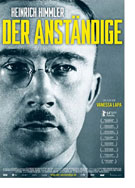

Opening 18 Sep 2014
Directed by:
Vanessa Lapa
Writing credits:
Vanessa Lapa, Ori Weisbrod
Though historians and filmmakers have plumbed the widths and depths of the Holocaust, this fascinating Israeli-Austrian-German coproduction depicts its terror from a different angle. In February 2014, private letters and diaries of Heinrich Himmler, Reichsführer of the Schutzstaffel and architect of the genocide, were published for the first time. In private hands in Israel for decades, the materials were confiscated from the Himmler home in Bavaria as Germany lay in ruins after the war. Israeli director Vanessa Lapa used Himmler’s letters, plus visual material she gleaned from 53 archives in 13 countries, to craft this documentary about a family man and politician who was, when all was said and done, satisfied with himself. The Decent One won the prize for best Israeli documentary film at this year’s Jerusalem Film Festival.
Himmler’s childhood diary entries show his frustration at being too young to participate in the Great War and document his early interest in current events, dueling (he was an awkward and sickly youth), religion and sex. Following university studies and various disappointments, he joins the NSDAP and falls in love with Marga, seven years his senior. Their love letters, while playfully naughty, are, at his suggestion, efficiently numbered for future reference.
While no man is a hero to his valet, Himmler manages to always be a hero to his family. In their diaries, Marga Himmler, and later their daughter Gudrun, earnestly record their faith in the importance of Himmler’s self-sacrificing work. As the family moves from the striving middle class to the upper echelons of privileged Nazi society, Papa spends more and more time away from his darlings and at work on various fronts. Eye-opening footage includes that of Uncle Hitler’s jovial appearance at kiddie birthday parties and idyllic family outings to visit the camp at Auschwitz. But as the tone of the letters home becomes more strained, the images of Himmler’s SS at work become grimmer. Prisoners are executed, and corpses abused. This film is not for the faint of heart.
And yet Himmler writes in Gudrun’s friendship book, “In life, one must always be decent and brave and kind.“ The Decent One asks how a man can live by his own upright principles while committing mass murder according to the principles of the rest of the world. One fears that, far from having waned with the Nazis’ defeat, such madness lives on still. (Brenda Benthien)
With photographs, journals, personal letters and documents, The Decent One attempts to examine the motivations and thought-processes of Heinrich Himmler, the man who orchestrated the Holocaust, as well as about his own family. The filmmakers attempt to sketch out a biography of Himmler’s life starting from letters announcing his birth and continuing on through the various love letters to his wife and correspondence with his family.
While certainly a fascinating exploration of Himmler’s personal life, it is just another example of the futile quest to answer the question of how anyone could orchestrate the mass murder of millions of people. The answer was certainly not discovered within the 94 minutes of this film and generations of psychologists will tell you it is not something so easily quantified.
Interestingly, the film humanizes Himmler while also progressively dropping stronger and stronger hints of the atrocities he is committing in his professional capacity. Initially he is a man adrift in the world, but then he finds a job, falls in love, marries, has a daughter and then an affair with his secretary. This could be the story of any man then and now. However, as the film progresses, the hints of anti-Semitism and conservative values grow, eventually leading to casual references to him visiting concentration camps. The final minutes of the film are incredibly gruesome clips of public executions and the tangle of human limbs that are certainly not for the faint of heart.
In the end, the audience is left with the cold fact that one can be an upstanding member of society and a family man while still committing such atrocities as the Holocaust. The question is always asked “How could anyone do that?” The result is that his monstrous traits are just the reflection of his seemingly good ones. His nationalistic pride, his conservatism, his belief in protecting those he loved are the very things that allowed him to have no problems with killing millions. There is no quantifying the capability of humans to do horrific acts and The Decent One doesn’t change this fact.
Press conference at the 2014 Berlinale film festival
The documents used in this film were discovered in 1945 by US troops who occupied Himmler’s family home. Despite being told to hand over the documents to the government, they disappeared for years and reappeared in a Tel Aviv archive. Some say that a man kept it under his bed for forty years. Now they are held in a safety deposit box.
The film uses the childhood diaries of Himmler’s daughter, Gudrun Burwitz (née Himmler). The filmmakers have contacted legal counsel in order to be certain they are legally allowed to use it, although, when contacted, Gudrun Burwitz declined to work with the film.
Trivia
Gudrun Burwitz has remained active in the Nazi community for years and has been a member of Stille Hilfe (Silent Aid), an organization which provides assistance to arrested, condemned, and fugitive SS members, since 1951. (Rose Finlay)